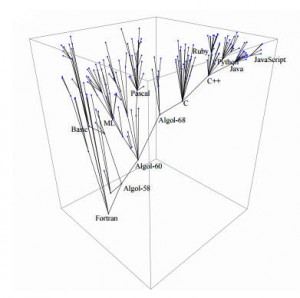Evolution is an idea that often appears in articles about how the Web is developing over time. These discussions tend to rely on human expertise and historical case studies, covering a wide range of social and technical factors that have been involved in the Web’s transformations (Hall & Tiropanis 2012). I find such accounts very insightful and get really excited when I see parallels with the type of evolution which I studied during my previous degree. However, this former background also nudges me to question our current understanding of Web evolution and how the study of it can be improved.
In fields related to biology, evolutionary concepts tend to be embedded in a core of shared theory, empirical evidence and detailed discussions of the possible mechanisms involved. The evolution of the Web has not yet accumulated such a vast volume of literature, but we can draw upon more established evolutionary approaches to start developing this. In fact, something similar is already being done in the emerging interdisciplinary field of Cultural Evolution, where researchers are using Darwinian theory and powerful quantitative methods to study a wide range of social, cultural and technological phenomena (Mesoudi 2011). This has largely been done offline up until now, but there is growing evidence to suggest that the Web is a fertile ground for similar investigations.
Here are a few ideas about how cultural evolutionary theory (along with a bit of Network Science, Sociology and Psychology) could be applied to study different aspects of Web evolution:
- We hear stories about how new Web technologies get created using improved combinations of previous inventions. It might be interesting to identify the exact inherited components and systematically examine how they influence and constrain the future development of something. A really cool example of this comes from Valverde & Solé (2015), who studied the evolution of programming languages using data from Wikipedia. Here’s a pretty picture from their results:

- The co-evolution of technology and society has been a prominent topic throughout our course so far. Various claims regarding the importance of social and technological feedback loops have been presented, mainly being supported by case studies (e.g. historical accounts of bicycles, bridges and facebook). Maybe we can try to strengthen such arguments in Web Science by obtaining more empirical evidence of the social and technical processes that are involved.
- People’s interactions with the Web and its subsequent evolution may be guided by evolved aspects of our own cognitive tendencies (e.g. what kind of content we like, who we pay attention to). My previous research explored this idea by looking at how our cognition might affect Reddit voting patterns (Priestley & Mesoudi 2015). Although the results were promising, it would be good to test this area further using more reliable methods.
I’m not sure where I’m going with these ideas yet. One option is to focus on just one of them, or they could be used as sub-topics to support the broader case for embracing evolutionary theory in Web Science. Any critiques or comments would be greatly appreciated 🙂
References:
Hall, W., & Tiropanis, T. (2012). Web evolution and Web science. Computer Networks, 56(18), 3859-3865.
Mesoudi, A. (2011). Cultural evolution: how Darwinian theory can explain human culture and synthesize the social sciences. University of Chicago Press.
Priestley, M., & Mesoudi, A. (2015). Do Online Voting Patterns Reflect Evolved Features of Human Cognition? An Exploratory Empirical Investigation. PloS one, 10(6), e0129703.
Valverde, S., & Solé, R. V. (2015). Punctuated equilibrium in the large-scale evolution of programming languages. Journal of The Royal Society Interface,12(107), 20150249.

Hi Maria!
That looks like a very interesting topic and – although it is probably too early to ask that question – I am intrigued whether you are going to continue research on it on your PhD? 😉
Also, the mixture of Network Science and Evolutionary theories (like Darwinian) sounds terribly interesting and may lead to interesting results.
Thanks Bartosz!
Yep, my plan is to use these assignments to test out the topic and see if I could tolerate it for the PhD. I’m feeling very drawn to Network Science at the moment, but it’s an area which I know nothing about… so that will be fun! 🙂
Hello Maria!
Sorry for not writing before, I think they are all really interesting topics! I think the most recurrent ideas of evolution are the selection of those species that better adapt to the environment changes and the transmission of helpful characteristics to the descendants. So, there may be a lot of theoretical frameworks in the evolutionary theories that would help us to better visualize why the Web has changed, how it changed and how those changes affect us. Also, it would be interesting to divide the technologies that compose the Web into “species” and model their interactions in creating new tech by adapting themselves, joining together to create a new technology or falling and being marginalized and extinct.